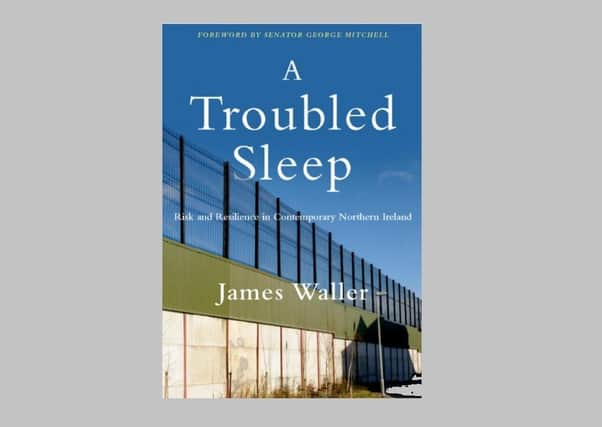Book Review: We are ignoring problems that could propel Northern Ireland back to horrors of the past


A Troubled Sleep by James Waller. Published by Oxford University Press
You won’t read a starker assessment of the realities of Northern Ireland’s attempted journey from conflict to post-conflict than this recently published book from Professor James Waller.
Advertisement
Hide AdAdvertisement
Hide AdThere is legitimate worry the violence is only buried under shallow layers of memory, not gone.


As I have argued throughout the book, those “bad days and bloody ways” are perilously close to returning. Peace is far more than a breath away. The risk of a return to violent conflict is progressively accumulating in a rising tide, and resilience is rapidly receding.
Critics will contend I have emphasised risk at the neglect of resilience. To be sure, I may have missed the mark to some degree, on both sides of that equation. To be equally sure, however, there is a strong evidence-based argument to be made, as I have tried to do, for the reality that, rather than moving forward to a shared future, contemporary Northern Ireland is at increased risk of being dragged back into a violent past.
Waller is Cohen Professor of Holocaust and Genocide Studies and not a man given to sugar-coating.
Advertisement
Hide AdAdvertisement
Hide AdHis analysis of the ‘myriad brutal dualities’ that still haunt the peace process is a reminder—not that we should need one after two decades of serial failure and impasse—that there isn’t just one truth here, but many kinds of truth.
It’s also a reminder that Northern Ireland’s peace process really doesn’t deserve to be presented as some sort of template for others to follow, particularly when the constructive ambiguity on which it was built (which was supposed to make it adaptable and flexible when required to push progress), very quickly morphed into destructive clarity (ensuring that cement and hard language would always matter more than compromise and nuanced voices).
He makes an especially important observation, one I hadn’t fully taken on board before: ‘Reconciliation implies, however, that the two parties were in a state of conciliation at some previous point; that there was an earlier version of history in which combatants were colleagues, enemies were friends. In the north of Ireland’s history, notes on conciliation are drowned out by the cacophony of the irreconcilable.’
I’ve noted in my own writing—and Waller has touched upon it several times throughout the book—that the past is the comfort zone both political communities (and the electoral support for those communities is still 80% + after 23 years of a peace process) return to because they cannot agree on the present or future.
Advertisement
Hide AdAdvertisement
Hide AdAnd I’ve also noted in many columns for the News Letter that real, genuine reconciliation must always be impossible when the issue of constitutional identity remains front and centre of everyday politics.
Waller takes no pleasure in his conclusions: indeed, he goes out of his way to offer evidence to counter his own arguments and acknowledges that much time and funding has been invested in cross-community schemes and projects to deconstruct the identity-based social divisions that dominate everyday life in a socially and politically fragmented society.
But it’s hard to disagree with his view, ‘Northern Ireland as it is remains Northern Ireland just as it was. All the divisive attitudes that were there before 1998 are still there; perhaps even more pronounced.’
This is the sort of book that makes congenital, professional Pollyannas respond with a furrowed brow, a sad shake of the head and a torrent of cliché.
“It’s better than it used to be.”
“Peace always takes time to bed down.”
Advertisement
Hide AdAdvertisement
Hide Ad“How can anyone make progress against the torrent of negativity.”
“Would you prefer we returned to the bad old days?”
“Our children haven’t had to endure what we endured.”
The problem with that approach to the realities they see all around them (and I am assuming, of course, they’re not blind) is it’s built on a lie.
Or on a delusion.
Or on a hope that has never become anything more than a hope. As Waller says, Northern Ireland is still divided: chronically so.
We divide ourselves.
We divide our children.
We divide our ambitions for the future.
We divide our sense of identity.
Every issue—even those you wouldn’t have thought capable of being reduced to us-and-them—is divided.
Advertisement
Hide AdAdvertisement
Hide AdThere were even moments during the Executive’s response to Covid when we saw a virus in either an orange or green light.
What makes Waller’s contribution so important is its refusal—a ruthlessly honest refusal, in my opinion—to see anything through rose-tinted glasses.
Yes, we should be thankful that life is lived easier now than it was when I first arrived in Belfast in the mid-1970s. But that gratitude shouldn’t blind us to the fact that we’re watering the dishonesty and ignoring the kicked-into-the-long-grass-problems that could propel us back to the horrors of the past.
Worse, we’re admitting to our children—the next generation we keep talking about—that the failure to resolve and reconcile our own past has forced us to pretend about their present and future.
He concludes with this paragraph:
Advertisement
Hide AdAdvertisement
Hide AdMore than two decades after the Good Friday Agreement, contemporary Northern Ireland finds itself in a shallow, troubled sleep, and its future, moving more quickly each day, is trending in a darker and dangerous direction. As Northern Ireland approaches its centenary, how it awakes from that troubled sleep will determine whether it is on the edge of a new beginning or a painfully familiar old precipice.
That was written before the full impact of the protocol and the response of unionism/loyalism to it had kicked in.
The Executive is again on the precipice. Power-sharing is on the precipice.
Inter-community relationships are on the precipice. UK/NI/RoI relationships are on the precipice.
How long before all Northern Ireland is on it?
Advertisement
Hide AdAdvertisement
Hide AdAnd we’re heading there because there have been far too many propagandising for the Good Friday Agreement and not enough willing to ask uncomfortable questions and highlight uncomfortable truths.
•Alex Kane is a commentator and former Ulster Unionist Party director of communications
——— ———
A message from the Editor:
Thank you for reading this story on our website. While I have your attention, I also have an important request to make of you.
With the coronavirus lockdown having a major impact on many of our advertisers — and consequently the revenue we receive — we are more reliant than ever on you taking out a digital subscription.
Advertisement
Hide AdAdvertisement
Hide AdSubscribe to newsletter.co.uk and enjoy unlimited access to the best Northern Ireland and UK news and information online and on our app. With a digital subscription, you can read more than 5 articles, see fewer ads, enjoy faster load times, and get access to exclusive newsletters and content. Visit https://www.newsletter.co.uk/subscriptions now to sign up.
Our journalism costs money and we rely on advertising, print and digital revenues to help to support them. By supporting us, we are able to support you in providing trusted, fact-checked content for this website.
Ben Lowry
Acting Editor